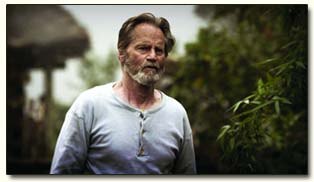|

In "Blackthorn", a beautiful western shot in the exotic
high country of Bolivia, Sam Shepard plays an old outlaw
in hiding. A famous old outlaw, long believed dead.
James Blackthorn, he calls himself, though his real name
is Butch Cassidy.
Yes, as in Butch Cassidy and the Sundance Kid.
Was Shepard, the playwright/musician/director/fiction
writer/actor, at all wary of taking on a character
immortalized in one of the biggest box-office hits of
the late '60s?
"No, I thought it was always a good idea, because of the
script," he says. "It was so great. Plus the fact that
they were going to shoot in Bolivia interested me. The
original "Butch Cassidy and the Sundance Kid" never
influenced me, or got in the way of this thing, because
I thought it was entirely its own animal. I wasn't
bothered at all by following in the footsteps of
anything.
"The funny thing is, somebody asked me who I was playing
in the movie, and I told them: Butch Cassidy. And they
said you don't look anything at all like Paul Newman."
Shepard, on the phone from New York, laughs.
"Yeah, then I understood that the character is totally
separate from the actor."
Among his castmates in Blackthorn is Stephen Rea, the
Irish actor, playing a grizzled Pinkerton agent who's
long been on Blackthorn's trail. Shepard and Rea have
known each other since the '70s.
"Stephen is one of my oldest friends," Shepard says. "We
did a lot of theater together. We've done two plays at
the Abbey Theatre that I wrote and directed him in. But
this is the first time I've ever acted with him - and
his character goes through this crazy transformation."
Shepard, of course, is also good friends with Patti
Smith, the poet-turned-rocker (and prize-winning
memoirist). They, too, have known each other since the
1970s, and Shepard is playing on two songs on the album
Smith's currently recording.
Asked whether he's ever conscious - or self-conscious -
about all the different fields he's plowing, Shepard
says no, not really.
"Mostly, it feels seamless," he explains, "because I've
always connected it to theater. Now and then it feels
weird, because there are so many different parts to what
I'm doing. But typically, they all feel like parts of
the same creature.
"You have to honor the form that you're addressing, but
hopefully you don't see the stitches."
|